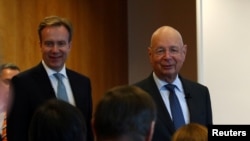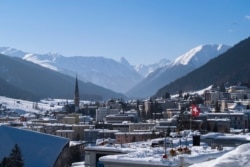Environmental issues make up the top five risks to the global economy for the coming decade, organizers of next week's World Economic Forum in the Swiss ski resort of Davos said Wednesday.
Citing a survey of hundreds of key decision-makers, the WEF pointed to potentially catastrophic trends like global warming and the extinction of animal species — underscoring how the environment has surged up the international policy-making agenda ahead of risks like cyberattacks, recession and nuclear proliferation.
The concerns are especially acute, it added, at a time of growing international division, evident in global disputes like the trade war between the United States and China.
"The political landscape is polarized, sea levels are rising and climate fires are burning," said Borge Brende, president of the World Economic Forum.
"This is the year when world leaders must work with all sectors of society to repair and reinvigorate our systems of cooperation, not just for short-term benefit but for tackling our deep-rooted risks."
Brende said the world has a decade to deal with the climate emergency, and that not doing so within that time frame would be akin to "moving deckchairs on the Titanic."
The 750 global experts and decision-makers questioned in the Global Risks Report 2020 identified economic disputes as the number one risk to the global economy this year. For the longer-term outlook, however, environmental concerns accounted for the top five risks.
The findings illustrate how environmental issues have become more important to the public and to policymakers, particularly over the past year, which has seen high-profile campaigning efforts from the likes of Swedish teen activist Greta Thunberg and the Extinction Rebellion group.
The biggest long-term risk cited in the report was the possibility of extreme weather events, such as floods or storms. The others were the failure to properly plan for climate change, man-made environmental disasters such as oil spills, major biodiversity loss, and natural disasters such as earthquakes or tsunamis.
"There is mounting pressure on companies from investors, regulators, customers, and employees to demonstrate their resilience to rising climate volatility," said John Drzik, chairman of Marsh & McLennan Insights, which along with Zurich Insurance Group helped the WEF compile the report.
"High profile events, like recent wildfires in Australia and California, are adding pressure on companies to take action on climate risk at a time when they also face greater geopolitical and cyber risk challenges."
Though there's been a shift toward populist and nationalist politics around the world, Drzik said that those in the ``executive suite`` are under mounting pressure from customers, employees, investors, rating agencies or regulators to tackle climate issues.
The trend was highlighted this week when BlackRock CEO Laurence Fink said his firm, which manages some $7 trillion for investors, will put climate change and sustainability at the heart of its investing approach.
"When your stakeholders align, I think there is an impact on CEOs whatever their underlying philosophy ... As pressure mounts, you get more of a response,`` Drzik said.
The annual gathering of the business and political elites in Davos can help in that process, he said, as it assembles "the influencers from the sectors that have to work together."
The annual Davos meeting has been criticized over the years by those who say it's just a talking shop for leaders flying in their private jets to enjoy some winter snow.
Adrian Monck, the WEF's managing director, defended his organization's stance when it came to climate issues. He noted that most people who go to Davos go up the mountain from Zurich by train. He also pointed out that the WEF has carbon-offsetting programs and that biofuels are available at Zurich Airport to those who opt to jet into Davos.
"It is something we take very seriously," he told a press briefing in London. "There is nothing worse than an organization identifying a risk and doing nothing about it."
U.S. President Donald Trump, who has taken a more unilateralist approach to international issues than his predecessors, is likely to be one of the main points of interest next week, alongside Thunberg who is appearing at the forum for the second year running.






